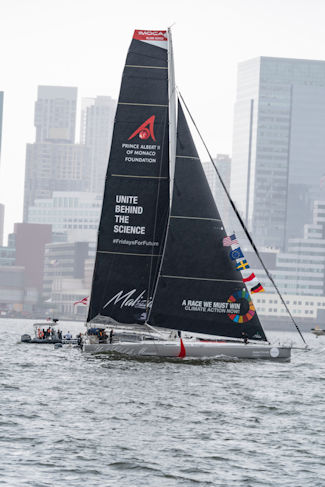The question that has vexed me most during Greta Thunberg’s voyage across the Atlantic and her subsequent travels, is what is she going to bring back?
I know she has yet to commit to how she’ll be heading home via the Madrid climate change conference, but given that return loads are very important in logistics, one would hope she is preparing to maximise all opportunities.

I would have suggested that, in the spirit of Sir Walter Raleigh, she could have been stuffing the multi-million-pound yacht’s hull with tobacco or potatoes, or better still a few scientists from the MIT.
Unfortunately, that doesn’t look likely to happen as apparently crew members flew out to the US to bring the racing yacht back to Europe – I guess she only ‘booked’ a one-way ticket.
Greta has been lauded and applauded for doing things differently and thinking outside the box and that’s something the waste industry tries to do too.
Witness the transformation after the skip was invented (by the French no less). It revolutionised the waste industry, no longer did waste have to be hand-loaded by a driver into the back of a lorry, blocking the site and holding up site deliveries. Soon, new skips could be exchanged for full ones and the driver’s day was optimised.
Further strides forward saw skips purposed for the collection of different materials, allowing waste to be segregated on site for recycling.
Within the next few years, compaction vehicles and containers had been invented allowing greater payloads and optimising space still further.
Perhaps the greatest invention of all in the recycling industry however, was the standardisation of shipping containers, allowing near perfect control over goods moving around the world, including those sent for recycling.

Overnight it became possible in India to make paper from newsprint imported from around the world, rather than cut down mahogany rainforests. Likewise, revolutions in shipping meant minerals mined in Australia like bauxite could be smelted in places like Iceland, using Zero Carbon Energy in bulk carriers carrying up to 400,000 tonnes at a time.
A world connected, and powered just like the internet, on fossil fuels.
Gadgets
Recent coverage of all the climate change protests have shown it looks far more fun chaining oneself to a diesel fire engine and spraying mock blood on a building, than it is to try turning off a teenager’s 24-hour ‘nobrainathon’ on Fortnite; muting Mumsnet on a Monday afternoon; Facebook on a Friday; or Twitter (forever)!
Yet we forget these little electronic devices with their apps and social media are quietly eating away at the same atmosphere as the ships, the aeroplanes and the cows – the gadgets just happen to be a lot more fun.
I find it surprising that many of the things that have brought the world closer together both generationally and geographically now seem to be driving us apart – perhaps we should be embracing the good elements, rather than dwelling on the bad.
After all, without social media we wouldn’t be able to follow Greta’s adventures so closely.






Subscribe for free